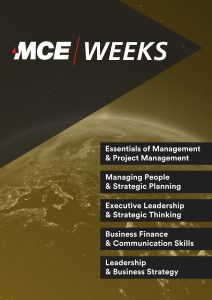Become a strong, passionate, and effective communicator with your colleagues, managers and senior management. Many managers are experts in their own areas, but haven’t really had the time to learn about finance they need in their role.
Module 1 (2 Days)
Communicating Up, Down and Across the Organization
Key Competencies
- Communication skills
- Motivating your team
- Building self-confidence
- Influencing skills
- Developing your message
- Building trust & credibility
Learn, Practice and Use
- Analyse your audiences and different possible situations in advance
- Create simple processes to adapt your message to specific audiences
- Apply clear strategies to influence and motivate others throughout the organization
- Understand how communication can impact how much influence you have
- Exhibit a strong sense of self-confidence with your peers, direct reports and managers
- Practice skills for delivering messages that are clear, professional and effective
- Use different presentation formats to motivate, influence and inform
- Identify the best uses of communication technologies available today
- Develop messages that speak both to the mind and the heart
Full Module details
Solving Real Workplace Communication Issues
- Recognize the role of communicating in developing influence and improved productivity
- Identify your specific workplace up/down/across communication challenges as focal points
Putting the Best “You” Forward
- Exhibit a strong sense of confidence and external image
- Create and maintain credibility and trust with others
- Apply strategies to build and use rapport with colleagues
Targeting your Message to the Audience
- Analyse the audience to create messages that address listeners’ specific needs
- Assess and speak to others’ organizational positions, roles, and responsibilities
- Create multidimensional messages that speak to both the mind and the heart of listeners
Targeting your Message to the Situation
- Identify the best uses of various forms of communication technologies
- Choose the most appropriate communication channel to be effective in various work situations
- Assess and plan effective messaging in teams and groups when up, down, and across members are all present
Framing the Message
- Apply message framing strategies to create an open and responsive communication environment
- Assess influencing preferences and situational needs to impact personal persuasive ability
- Practice skills for delivering messages that promote clear and productive communication
Motivating and Influencing Throughout the Organization
- Build productivity by applying up, down, and across motivational communication strategies
- Evaluate and practice various motivational, informative, and influencing presentation formats
Module 2 (3 Days)
Essentials of Business Finance
Key Competencies
- Business finance
- Understanding financial ratios
- Cost analysis & profit planning
- Reviewing financial statements
- Effective budgeting
- Capital expenditure analysis
Learn, Practice and Use
- Get a better understanding of the numbers side of your job
- Learn how to “think finance” and use data to make better decisions
- Develop proactive working relationships with finance professionals
- Gain greater confidence with a working knowledge of business financials
- Understand the business dynamics of cash —and take initiatives that meet your team’s, department’s or company’s short and long-term goals
- Take the guesswork out of your decision-making and use financial data to deliver a better bottom line
- Distinguish between capital expenditure budgets and operating budgets
- Understand the role of budgeting and issues that budgets can solve
- Share your knowledge and challenges with your peers and MCE’s highly experienced faculty
Full Module details
Basic Accounting Concepts
- The Importance of the Accounting Equation
- The Accrual Process
- The Difference Between Accounting Profit and Cash Flow
Understanding Financial Statements
- Understand the Purpose of and Terminology Associated with the Following Financial Statements
- Income Statement or Profit and Loss Statement (P&L):
- Balance Sheet
- Statement of Retained Earnings
- Cash Flow Statement
- Prepare a Set of Simple Financial Statements
- Understand the Accounting Process, from the Recording of Business Transactions to the Preparation of Financial Statements
- Understand How Various Business Transactions Affect the Financial Statements
Reviewing an Annual Report
- Various Components of an Annual Report
- Importance of Notes in Evaluating Financial Statements
- External Auditor’s Role and the Significance of the Opinion Letter
Evaluating a Company’s Financial Statements
- Calculate the Key Financial Ratios Using the Financial Statements
- Use Financial Ratios to Evaluate:
- An Organization’s Liquidity, Leverage and Profitability
- The Performance of an Organization as Compared to Its Competitors’
- An Organization’s Performance Compared with Budgeted Goals
- Identify Sources of Financial Information Beyond the Financial Statements
- Use the Dupont Formula to Evaluate Management Performance
- Use the Concept of Economic Value Added (EVA(R)) and Cash Flow Return on Investment (CFROI) to Determine if a Segment of an Organization Is Adding Value to the Business
Improving Profitability Through Cost Analysis and Profit Planning
- Differentiate Between Fixed and Variable Costs
- Help Your Organization Improve Profitability Through the Use of:
- Break-Even Analysis
- Contribution Margin Analysis
- Direct Costing in Appropriate
- Understand Traditional Cost Accounting and Its Limitations
- Understand the Relevance of Activity-Based Costing in Today’s Business Environment
Capital Expenditure Analysis
- Distinguish Between Capital Expenditure Budgets and Operating Budgets and Understand the Function of the Capital Budget
- Understand Why Cash Has a Time Value
- Recognize and Apply Different Methods of Evaluating Capital Expenditure and Monitoring Project Performance
Budgeting More Effectively
- Understand the Role of Budgeting and Issues That Budgets Can Solve
- Understand the Budgeting Process
- Identify Different Types of Budgeting Systems in Use Today
- Analyze Budgets for Different Purposes
- Recognize and Apply Different Methods of Evaluating and Monitoring Operating Performance
Dates & Locations
22 May – 26 May (Brussels)
19 Jun – 23 Jun (Prague)
7 Aug – 11 Aug (Paris)
4 Dec – 8 Dec (Frankfurt)
Duration
5 Day(s)
Price
€3995


